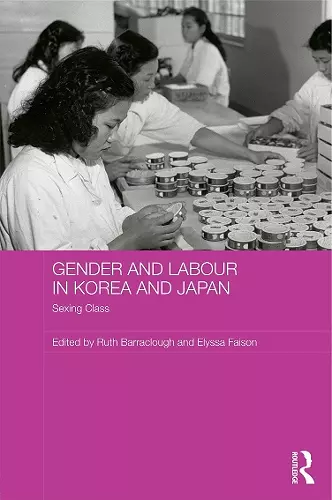Gender and Labour in Korea and Japan
Sexing Class
Ruth Barraclough editor Elyssa Faison editor
Format:Hardback
Publisher:Taylor & Francis Ltd
Published:24th Jul '09
Currently unavailable, and unfortunately no date known when it will be back
This hardback is available in another edition too:
- Paperback£55.99(9780415673587)

Bringing together for the first time sexual and industrial labour as the means to understand gender, work and class in modern Japan and Korea, this book shows that a key feature of the industrialisation of these countries was the associated development of a modern sex labour industry. Tying industrial and sexual labour together, the book opens up a range of key questions: In what economy do we place the labour of the former "comfort women"? Why have sex workers not been part of the labour movements of Korea and Japan? Why is it difficult to be "working-class" and "feminine"? What sort of labour hierarchies operate in hostess clubs? How do financial crises translate into gender crises? This book explores how sexuality is inscribed in working-class identities and traces the ways in which sexual and labour relations have shaped the cultures of contemporary Japan and Korea. It addresses important historical episodes such as the Japanese colonial industrialisation of Korea, wartime labour mobilisation, women engaged in forced sex work for the Japanese army throughout the Asian continent, and issues of ethnicity and sex in the contemporary workplace. The case studies provide specific examples of the way gender and work have operated across a variety of contexts, including Korean shipyard unions, Japanese hostess clubs, and the autobiographical literature of Korean factory girls. Overall, this book provides a compelling account of the entanglement of sexual and industrial labour throughout the twentieth century, and shows clearly how ideas about gender have contributed in fundamental ways to conceptions of class and worker identities.
"This edited volume is a marvelous text in terms of understanding gendered labour in Japan and South Korea."- Jesook Song, Pacific Affairs: Volume 83, No. 4 – December 2010
"Women are often divided by their gender roles in traditional societies. They must choose to either erase their gender or maintain their femininity; and between their reproductive role and being objects of male sexual pleasure, cast as either mothers and wives or as prostitutes. Women’s role as industrial workers hangs in the balance between the two. In closely examining this divide and the experiences of the women who exist within it, this book makes a significant contribution to both gender studies and studies of labour history."Maho Toyoda, Kansai University, Asian Studies Review
ISBN: 9780415776639
Dimensions: unknown
Weight: 470g
166 pages